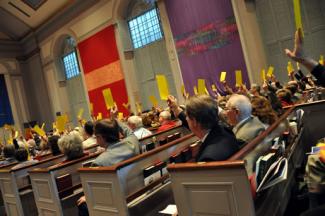Bank divestment, criminal justice reform and disaster preparedness are among the issues that eastern Massachusetts Episcopalians will put their voices and votes to when they gather for the diocese’s 227th annual convention.
They also will hear about the progress of the diocese’s Together Now fundraising campaign—publicly launched at last year’s convention—toward its $20-million goal, and will vote on the $6.3-million diocesan budget proposed for 2013.
The convention takes place Friday and Saturday, Nov. 2-3, at the Cathedral Church of St. Paul in Boston, with Bishop M. Thomas Shaw, SSJE and Bishop Gayle E. Harris presiding.
The annual legislative gathering brings together about 600 clergy members and elected delegates from each of the congregations of the diocese to set policy and a budget, as well as for common prayer and worship and to celebrate shared mission and ministry.
“Our Diocesan Convention is such an important part of our Episcopal Church identity in the way that it draws all of us into the governance of our church,” Shaw said. “Regardless of our individual positions on the issues, our deliberations together are really important because they help inform our mission strategy and our advocacy on behalf of those we are meant to serve in Christ’s name. I’m looking forward to our time together in convention.”
Resolutions
Two of the five resolutions to come before the convention have an economic focus.
“A Call for Economic Reconciliation through Socially Responsible Banking” encourages divestment—by the diocese, the Diocesan Investment Trust, congregations and individuals—“from banks and financial institutions implicated in the foreclosure and financial crisis (including Bank of America, Wells Fargo, Citibank and JP Morgan Chase), and/or in illegal or predatory lending practices, particularly those targeting minority communities.” The resolution also encourages conversation “on our relationships to economic inequality and economic class more broadly, seeking to recognize economic inequality at individual, local and systemic levels.”
A second resolution, “Engaging Poverty and the Work of Economic Justice,” would commit the diocese “to teaching, preaching, organizing, advocating and building mutually transformative relationships with those who are poor to focus our hearts and the mission of our congregations and diocese on reducing poverty and increasing economic and racial justice.” It also calls for prayer and agenda time at all meetings “for reflection on how our work here and now engages issues of poverty,” and it encourages congregations both to join local faith-based organizing networks and seek out training in community organizing methods.
A resolution titled “Criminal Justice Reform in Massachusetts” would commend several legislative priorities to the State Legislature in response to the “three strikes” habitual offender sentencing bill it passed in July: eliminate mandatory sentencing practices that the resolution’s proposers describe as having “a disproportionately negative effect on communities of color, result in exploding prison populations and require vastly increased enforcement costs”; grant judicial discretion “to tailor sentences to fit individual circumstances of particular crimes and offenses”; and reallocate state funding to address inmates’ mental health, addiction recovery and educational needs during and after their incarceration. The resolution also encourages congregations to participate in and help guide broader community discussion on matters of criminal justice and reconciliation.
Another resolution, “Preparing the Church to Respond to Local Disasters,” asks the Diocesan Council (the elected leadership body responsible for governance between conventions) to create a committee for the purpose of establishing and implementing a diocesan disaster response plan, to include a procedure for identifying local resources available to congregations, training opportunities for obtaining chaplaincy credentials and collaboration with other New England dioceses and Episcopal Relief and Development to provide information and encourage congregations to develop their own response plans.
The convention will also consider “Strengthening Communications Ministries for Parishes.” That resolution asks for a report in 2013 about the diocese’s response to two measures passed by the Episcopal Church’s General Convention in July, which challenge congregations to have dynamic Web sites by 2015 (A025) and dioceses and congregations to actively engage social media (D069).
[Find full text of resolutions in the Handbook, here.]
Budget
Convention also will consider the proposed diocesan budget for 2013. It is balanced at $6.3 million in core revenue and spending and $1.7 million in supplemental revenue and spending--level with the 2012 budget.
“In this year’s materials, you’ll see core and supplemental information—actuals for 2011, what was budgeted for 2012 and what is proposed for 2013. We are pleased to have achieved the goal of multiyear financial information so that we may refer to the past, manage the present and plan for the future,” explained Lisa Garcia, who chaired the Budget Committee this year and is running, uncontested, for election as diocesan treasurer.
Garcia described the diocesan budget as “a financial guide for the work we do together as a faith community.”
“It provides the information needed to be good stewards of the resources entrusted to the diocese. It also helps us to determine how we will bear witness to God’s calling through the programs we support and the initiatives we may pursue,” she said.
Elections
The Rev. Amy McCreath of the Church of the Good Shepherd in Watertown, the Rev. Brian Murdoch of common cathedral in Boston and the Rev. Andrew Stoessel of St. Michael’s Church in Marblehead are running for election to a clerical position on the Standing Committee.
Running for two lay positions on the Standing Committee are Margery Buckingham of St. Michael’s Church in Milton, Blanca Silvestrini of Christ Church in Cambridge, John M. Boyd of the Church of the Advent in Boston, Judith Nelson Dilday of St. Cyprian’s Church in Roxbury and Frank Foster of St. John’s Church in Arlington.
The Rev. Michael Hodges of St. Paul’s Church in Dedham, the Rev. Barbara Smith-Moran of Grace Church in Everett and the Rev. Kathleen Lonergan of Christ Church in Andover are running for two clerical positions on the Diocesan Disciplinary Board.
Find more information and all Diocesan Convention materials here.

